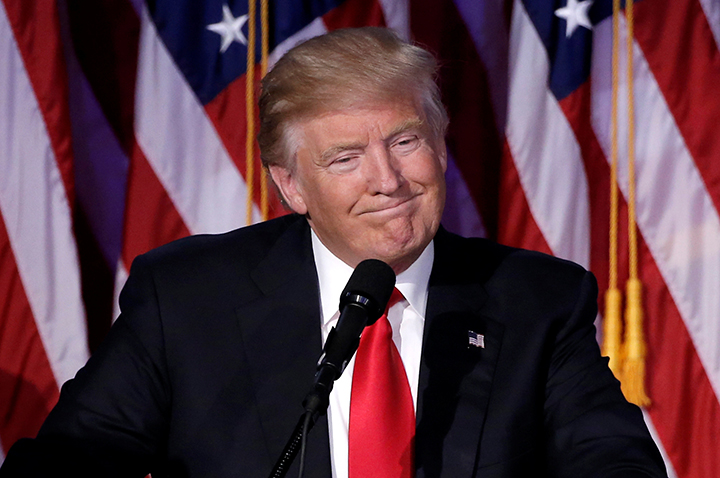 Donald J. Trump’s election as the forty-fifth president of the United States of America has brought a deep sense of uncertainty for the future, but it should come as no surprise when considering the conditions that made it possible for this New York City billionaire to win the highest office in the land.
Donald J. Trump’s election as the forty-fifth president of the United States of America has brought a deep sense of uncertainty for the future, but it should come as no surprise when considering the conditions that made it possible for this New York City billionaire to win the highest office in the land.
Three factors, in particular, contributed to Trump’s victory: the lingering impact of the financial crisis, the political gridlock in Washington, and perception of a failed US foreign policy. All three reveal a deep-seated desire for change, and yet all three existed even before Barack Obama was elected president in 2008.
The American electorate bears the brunt of these apparent failings, and the extent of the trauma that the financial crisis dealt to the electorate cannot be underestimated. Eight years after the global financial crisis, many Americans still feel the pinch of the losses that mounted in the wake of the crisis. Similarly, public disenchantment with Washington, as well as the partisan rancor and political gridlock in Congress, swung voters away from Hillary Clinton—an establishment candidate—and toward Trump—an outsider. Finally, the series of foreign policy missteps—starting with George W. Bush’s invasion of Iraq in 2003, and the ensuing long wars in that country and in Afghanistan—took a toll on Americans. That toll registered both economic and emotional costs. In search of relief, the voters demanded change. Trump was the candidate for change.
A leap into the unknown
While this outsider label served Trump well on November 8, it is precisely his lack of political experience that makes a Trump presidency seem such a leap into the unknown. It is unclear what kind of change President Trump can bring about—or event wants to undertake. What is clear, however, is that there will be change.
In the weeks ahead, as Trump builds his leadership team, we must pay close attention to the people he selects to be part of his administration. Whom he picks will provide clues to the shape of future policies and the overall direction that the administration will take. The expectation is a generational turnover—fresh faces, people from the private sector. This personnel change is likely to be on a scale far greater than what we witnessed during the Reagan revolution in the 1980s. Given the rancor of the campaign within the Republican party alone, questions linger over Trump’s relations with party dissenters, such as the “letter signers,” who publicly criticized Candidate Trump’s policy positions. Will these critics be brought into the fold of a Trump administration?
Another critical unknown factor is whether a Trump administration will be White House centric, focused on the president as leader (which is possible given Trump’s personality) or cabinet centric with a high-profile leadership team (which is another distinct possibility given Trump’s private sector ethos). Trump’s leadership style and the degree to which he takes a hands-on approach could be a key element in policy formulation for the next administration.
A Trump agenda
What will Trump’s agenda look like when he takes office in January of 2017? Trump is likely to be predominantly preoccupied with the domestic agenda in the first months of his presidency. He will have an opportunity to shape the trajectory of the Supreme Court and review important trade deals like the North American Free Trade Agreement (NAFTA). On the campaign trail, a recurring theme from Trump concerned rebuilding the US military, but the specifics, and the direction, are yet unclear. On any increases in military spending, he is likely to get some pushback from deficit hawks in his own party.
Internationally, it is clear there will be some strain in Trump’s relationships in Europe. The president-elect has been openly critical of German Chancellor Angela Merkel and of EU institutions. He celebrated Brexit—the British vote to leave the European Union. And notably, he has repeatedly insisted that the United States’ NATO allies must meet their 2 percent defense spending commitment. As president, Trump will have to walk a fine line: how do you push your allies to spend more on defense while not fragmenting the alliance?
Trump was elected with the expectation that he will bring about change, and his team will now have to manage those expectations. It takes anywhere from six months to a year for a new president to get his team up and running. Change, therefore, will take time.
Trump has built his reputation on his persona as a dealmaker. Will his deal-making acumen transfer from the world of real estate to that of foreign policy? Russian President Vladimir Putin may wish to explore the possibility of striking a deal with Trump, but only time will tell if this is a path that Trump himself would venture down.
At the end of the day, Trump is a man who likes to win. For him, a narrative focused on his success as president is imperative. It is then quite likely, then, that a Trump White House will be focused on ensuring that the message going out across the United States and the world is this: Trump’s is a winning presidency.
Richard R. Burt is an Atlantic Council board director. He is a former US ambassador to Germany.
Image: US President-elect Donald Trump spoke at an election night rally in New York City on November 9. (Reuters/Mike Segar)
